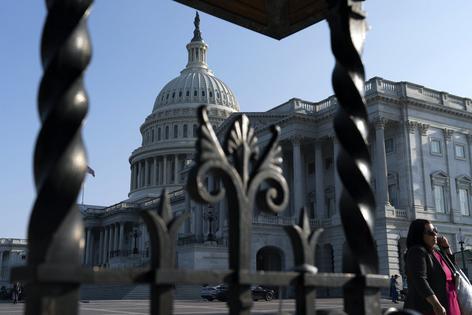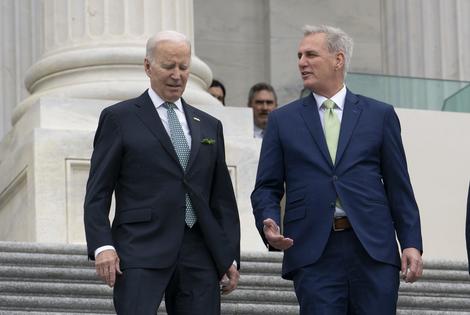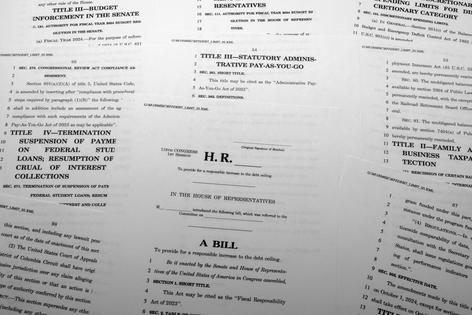House approval of debt ceiling deal a triumph of the political center
Published in News & Features
Talking with a friend about the debt ceiling negotiations, I mentioned that there were incentives for centrists in Congress to cobble together a deal. My friend said, incredulously, “Do we actually have centrists in Congress?”
Certainly, it is true that the country’s two major parties have sorted and separated over the last 50 years. The average Democrat is more liberal and the average Republican more conservative than the average in the 1970s – or even 10 years ago.
But with the House vote on GOP Speaker Kevin McCarthy’s deal with Democratic President Joe Biden to suspend the debt ceiling through Jan. 1, 2025, successful passage was undoubtedly carried by centrists. The middle may be shrinking, but it still exists, and it is critical in a closely divided Congress.
Why did the center carry such weight?
As a starting point, it helps to look at the spectrum of ideology within each party. There is significant ideological distance between, say, Barbara Lee, a liberal California Democrat, or the four progressive members of what’s called “The Squad,” and the two moderate Democrats, Jared Golden of Maine and Washington state’s Marie Gluesenkamp Perez, who voted with Republicans in late May to overturn Biden’s student debt relief policies.
Similarly, there is ideological space between Golden and Gluesenkamp Perez’s fellow member of the moderate, bipartisan Problem Solvers Caucus, Don Bacon, a Republican from Nebraska, and Colorado Republican and conservative firebrand Lauren Boebert.
Within the Republican-controlled House, this left ample space for GOP defectors to vote against the debt ceiling compromise, but also yielded dozens of Democrats who voted in favor, in the final 314-117 bipartisan vote. The two-party division of Congress belies the fact that the ideological distance between moderates in either party is not that great.
Another explanation of the center’s power in Congress now – and in the House debt ceiling vote – is the incentive that exists to be seen as a winning party. Being perceived by voters as a party that gets things done helps win elections – and centrists are often the ones whose votes are up for grabs, one way or another.
That said, there is an electoral cost for a party being too unified. On well-publicized votes on which party unity is enforced by party leaders, voters may come to see their representatives as too far from their own preferences. This is what some research has suggested happened to Democrats in the 2010 midterms with regard to the Affordable Care Act. Democrats had ferociously advocated for the legislation; as one scholarly study put it, they “paid a significant price at the polls” for that advocacy.
These incentives set the stage for the political wrangling over the debt ceiling. Speaker McCarthy had an incentive to pass legislation – to be seen as a winner. At the same time, there were Democratic House members who were driven by their own electoral prospects who wanted to be seen as moderate.
Josh Gottheimer, for example, who co-chairs the Problem Solvers caucus, is a Democrat from a moderate New Jersey district with just a narrow Democratic tilt. The bipartisan Problem Solvers Caucus proved critical to the bill’s passage by providing Democratic votes to help the bill survive GOP defections.
Complicating this incentive structure is the currently divided U.S. government. If one party controlled Congress and the presidency, then it would be clear that that party would be blamed in the event the legislation didn’t pass. But with a Democratic president and a GOP House, polling data shows an almost even split in terms of who would be blamed if a debt ceiling deal failed. Thus, both Democrats and Republicans had an incentive to get a deal done.
While there is some debate in political science over the power of presidential coattails, Democrats themselves may believe their future electoral fortunes are at least partially tied to that of President Biden, another incentive to support legislation he backs.
From here, the deal goes to the Senate, where moderates may be just as influential.
Given the smaller size of the upper chamber and the Democrats’ narrow majority, the influence of individual senators is more pronounced. The deal already contains a victory for West Virginia’s Joe Manchin, a Democrat looking at a brutal reelection fight in 2024. The bill contained approval for a natural gas pipeline project in his state that Manchin has championed.
Although the Senate vote is still pending, the House debt ceiling maneuvering demonstrates that the middle, while shrinking, continues to matter.
This article is republished from The Conversation, an independent nonprofit news site dedicated to sharing ideas from academic experts. Like this article? Subscribe to our weekly newsletter.
Read more:
Voters want compromise in Congress – so why the brinkmanship over the debt ceiling?
Sinema out, Warnock in – Democrats narrowly control the Senate and Republicans the House, but gridlock won’t be the biggest problem for the new Congress
Matt Harris does not work for, consult, own shares in or receive funding from any company or organization that would benefit from this article, and has disclosed no relevant affiliations beyond their academic appointment.













Comments